Entrepreneurship and Small Business Management Report: ESBM
VerifiedAdded on 2021/02/19
|15
|3808
|50
Report
AI Summary
This report provides a comprehensive overview of entrepreneurial ventures, examining their various types, including small business entrepreneurship, scalable startup entrepreneurship, large company entrepreneurship, and social entrepreneurship. It delves into the similarities and differences between these ventures, exploring their goals, risks, and structures. The report analyzes the impact of micro and small businesses on the UK's economy, using relevant data and statistics to illustrate their contribution. It also explains the significance of business start-ups in the growth of the social economy. Furthermore, the report identifies the characteristic traits and skills of successful entrepreneurs, differentiating them from traditional business managers, and assesses how entrepreneurial personality reflects motivation and mindset. Finally, it examines how personal background and experience can influence entrepreneurship, both positively and negatively, providing examples and critical evaluations. The report concludes by synthesizing the key findings and emphasizing the importance of entrepreneurial ventures in the broader economic landscape.

ENTREPRENEURSHIP
AND SMALL BUSINESS
MANAGEMENT (ESBM)
AND SMALL BUSINESS
MANAGEMENT (ESBM)
Paraphrase This Document
Need a fresh take? Get an instant paraphrase of this document with our AI Paraphraser

Table of contents
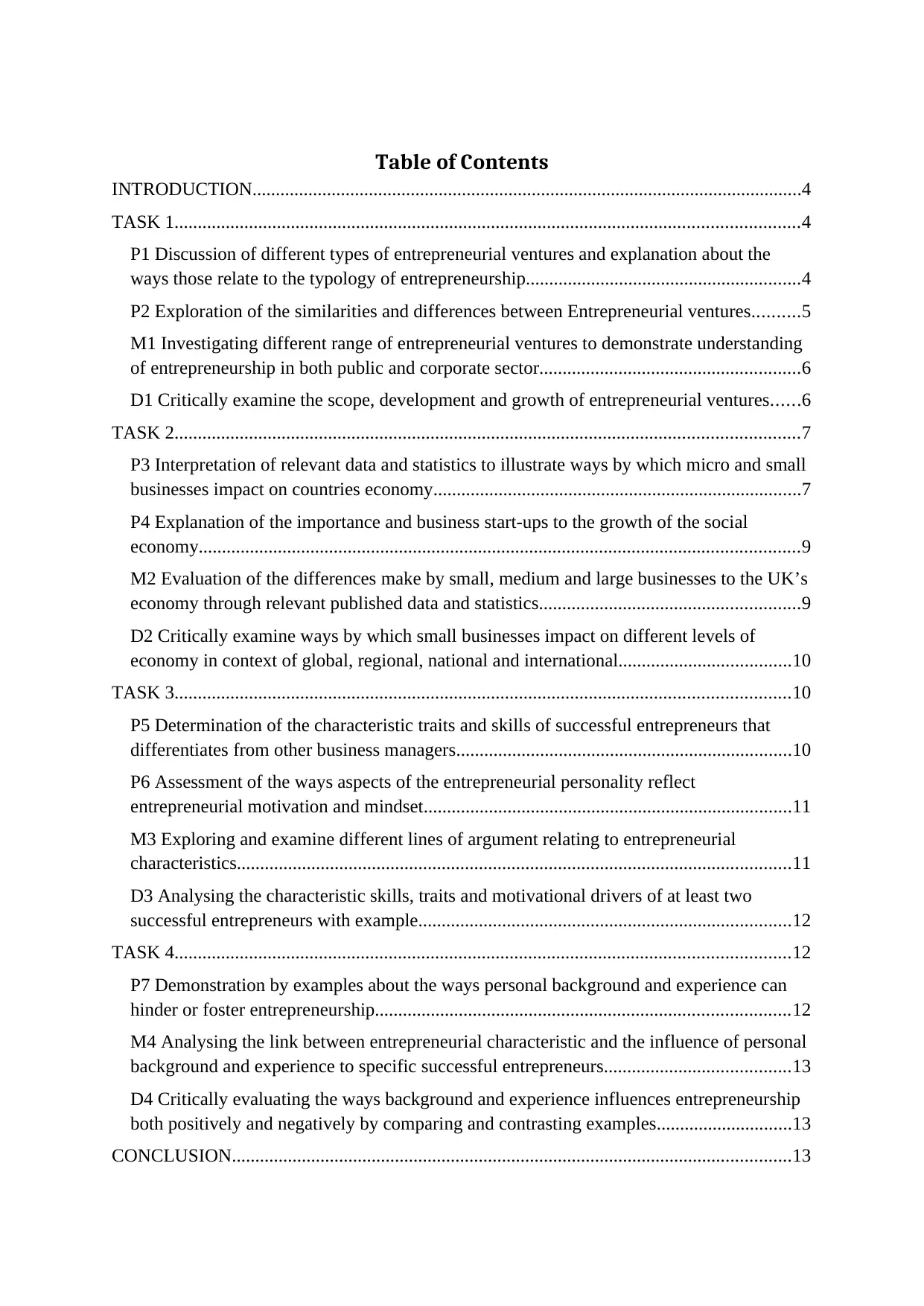
Table of Contents
INTRODUCTION......................................................................................................................4
TASK 1......................................................................................................................................4
P1 Discussion of different types of entrepreneurial ventures and explanation about the
ways those relate to the typology of entrepreneurship...........................................................4
P2 Exploration of the similarities and differences between Entrepreneurial ventures..........5
M1 Investigating different range of entrepreneurial ventures to demonstrate understanding
of entrepreneurship in both public and corporate sector........................................................6
D1 Critically examine the scope, development and growth of entrepreneurial ventures......6
TASK 2......................................................................................................................................7
P3 Interpretation of relevant data and statistics to illustrate ways by which micro and small
businesses impact on countries economy...............................................................................7
P4 Explanation of the importance and business start-ups to the growth of the social
economy.................................................................................................................................9
M2 Evaluation of the differences make by small, medium and large businesses to the UK’s
economy through relevant published data and statistics........................................................9
D2 Critically examine ways by which small businesses impact on different levels of
economy in context of global, regional, national and international.....................................10
TASK 3....................................................................................................................................10
P5 Determination of the characteristic traits and skills of successful entrepreneurs that
differentiates from other business managers........................................................................10
P6 Assessment of the ways aspects of the entrepreneurial personality reflect
entrepreneurial motivation and mindset...............................................................................11
M3 Exploring and examine different lines of argument relating to entrepreneurial
characteristics.......................................................................................................................11
D3 Analysing the characteristic skills, traits and motivational drivers of at least two
successful entrepreneurs with example................................................................................12
TASK 4....................................................................................................................................12
P7 Demonstration by examples about the ways personal background and experience can
hinder or foster entrepreneurship.........................................................................................12
M4 Analysing the link between entrepreneurial characteristic and the influence of personal
background and experience to specific successful entrepreneurs........................................13
D4 Critically evaluating the ways background and experience influences entrepreneurship
both positively and negatively by comparing and contrasting examples.............................13
CONCLUSION........................................................................................................................13
INTRODUCTION......................................................................................................................4
TASK 1......................................................................................................................................4
P1 Discussion of different types of entrepreneurial ventures and explanation about the
ways those relate to the typology of entrepreneurship...........................................................4
P2 Exploration of the similarities and differences between Entrepreneurial ventures..........5
M1 Investigating different range of entrepreneurial ventures to demonstrate understanding
of entrepreneurship in both public and corporate sector........................................................6
D1 Critically examine the scope, development and growth of entrepreneurial ventures......6
TASK 2......................................................................................................................................7
P3 Interpretation of relevant data and statistics to illustrate ways by which micro and small
businesses impact on countries economy...............................................................................7
P4 Explanation of the importance and business start-ups to the growth of the social
economy.................................................................................................................................9
M2 Evaluation of the differences make by small, medium and large businesses to the UK’s
economy through relevant published data and statistics........................................................9
D2 Critically examine ways by which small businesses impact on different levels of
economy in context of global, regional, national and international.....................................10
TASK 3....................................................................................................................................10
P5 Determination of the characteristic traits and skills of successful entrepreneurs that
differentiates from other business managers........................................................................10
P6 Assessment of the ways aspects of the entrepreneurial personality reflect
entrepreneurial motivation and mindset...............................................................................11
M3 Exploring and examine different lines of argument relating to entrepreneurial
characteristics.......................................................................................................................11
D3 Analysing the characteristic skills, traits and motivational drivers of at least two
successful entrepreneurs with example................................................................................12
TASK 4....................................................................................................................................12
P7 Demonstration by examples about the ways personal background and experience can
hinder or foster entrepreneurship.........................................................................................12
M4 Analysing the link between entrepreneurial characteristic and the influence of personal
background and experience to specific successful entrepreneurs........................................13
D4 Critically evaluating the ways background and experience influences entrepreneurship
both positively and negatively by comparing and contrasting examples.............................13
CONCLUSION........................................................................................................................13
⊘ This is a preview!⊘
Do you want full access?
Subscribe today to unlock all pages.

Trusted by 1+ million students worldwide
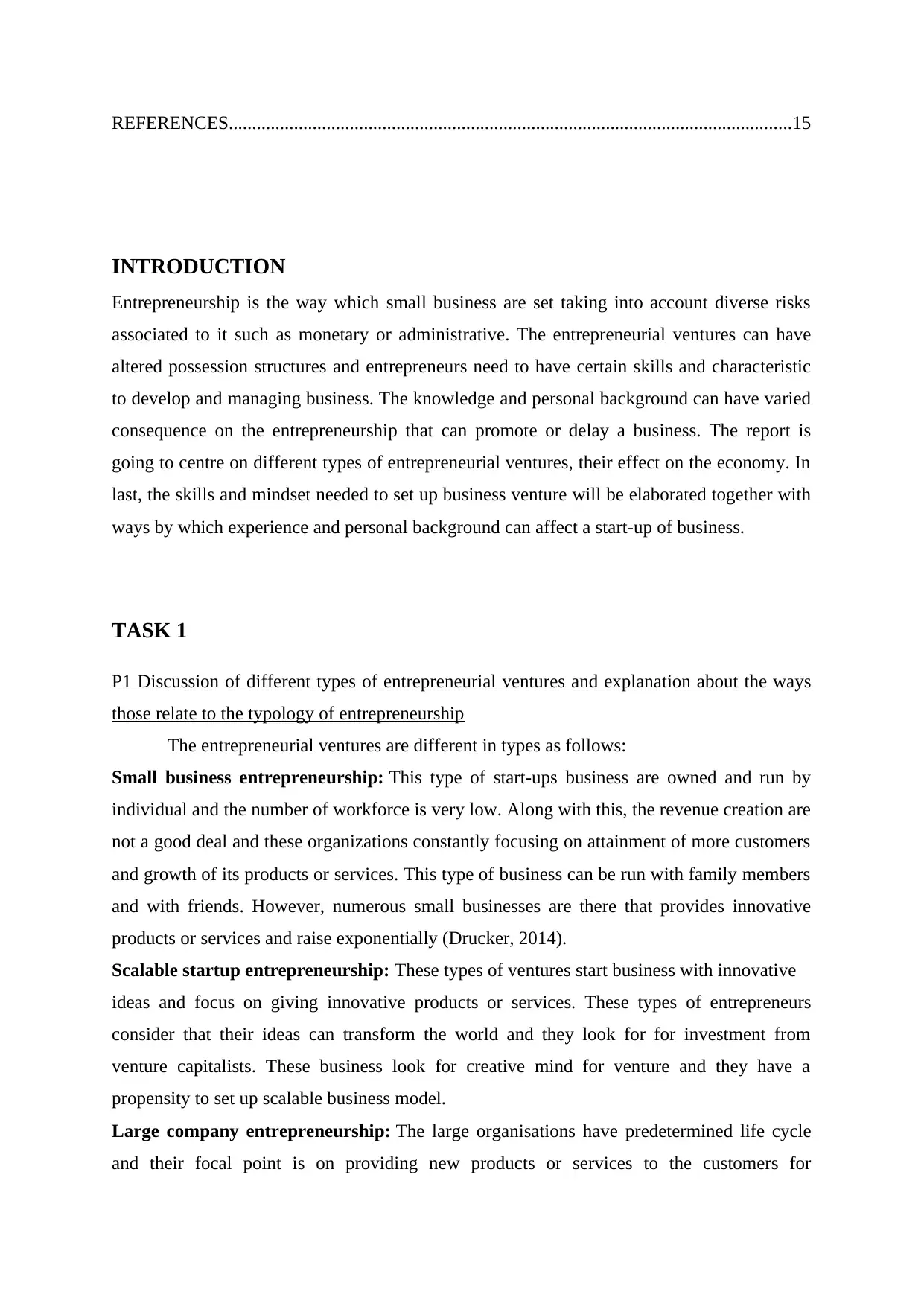
REFERENCES.........................................................................................................................15
INTRODUCTION
Entrepreneurship is the way which small business are set taking into account diverse risks
associated to it such as monetary or administrative. The entrepreneurial ventures can have
altered possession structures and entrepreneurs need to have certain skills and characteristic
to develop and managing business. The knowledge and personal background can have varied
consequence on the entrepreneurship that can promote or delay a business. The report is
going to centre on different types of entrepreneurial ventures, their effect on the economy. In
last, the skills and mindset needed to set up business venture will be elaborated together with
ways by which experience and personal background can affect a start-up of business.
TASK 1
P1 Discussion of different types of entrepreneurial ventures and explanation about the ways
those relate to the typology of entrepreneurship
The entrepreneurial ventures are different in types as follows:
Small business entrepreneurship: This type of start-ups business are owned and run by
individual and the number of workforce is very low. Along with this, the revenue creation are
not a good deal and these organizations constantly focusing on attainment of more customers
and growth of its products or services. This type of business can be run with family members
and with friends. However, numerous small businesses are there that provides innovative
products or services and raise exponentially (Drucker, 2014).
Scalable startup entrepreneurship: These types of ventures start business with innovative
ideas and focus on giving innovative products or services. These types of entrepreneurs
consider that their ideas can transform the world and they look for for investment from
venture capitalists. These business look for creative mind for venture and they have a
propensity to set up scalable business model.
Large company entrepreneurship: The large organisations have predetermined life cycle
and their focal point is on providing new products or services to the customers for
INTRODUCTION
Entrepreneurship is the way which small business are set taking into account diverse risks
associated to it such as monetary or administrative. The entrepreneurial ventures can have
altered possession structures and entrepreneurs need to have certain skills and characteristic
to develop and managing business. The knowledge and personal background can have varied
consequence on the entrepreneurship that can promote or delay a business. The report is
going to centre on different types of entrepreneurial ventures, their effect on the economy. In
last, the skills and mindset needed to set up business venture will be elaborated together with
ways by which experience and personal background can affect a start-up of business.
TASK 1
P1 Discussion of different types of entrepreneurial ventures and explanation about the ways
those relate to the typology of entrepreneurship
The entrepreneurial ventures are different in types as follows:
Small business entrepreneurship: This type of start-ups business are owned and run by
individual and the number of workforce is very low. Along with this, the revenue creation are
not a good deal and these organizations constantly focusing on attainment of more customers
and growth of its products or services. This type of business can be run with family members
and with friends. However, numerous small businesses are there that provides innovative
products or services and raise exponentially (Drucker, 2014).
Scalable startup entrepreneurship: These types of ventures start business with innovative
ideas and focus on giving innovative products or services. These types of entrepreneurs
consider that their ideas can transform the world and they look for for investment from
venture capitalists. These business look for creative mind for venture and they have a
propensity to set up scalable business model.
Large company entrepreneurship: The large organisations have predetermined life cycle
and their focal point is on providing new products or services to the customers for
Paraphrase This Document
Need a fresh take? Get an instant paraphrase of this document with our AI Paraphraser
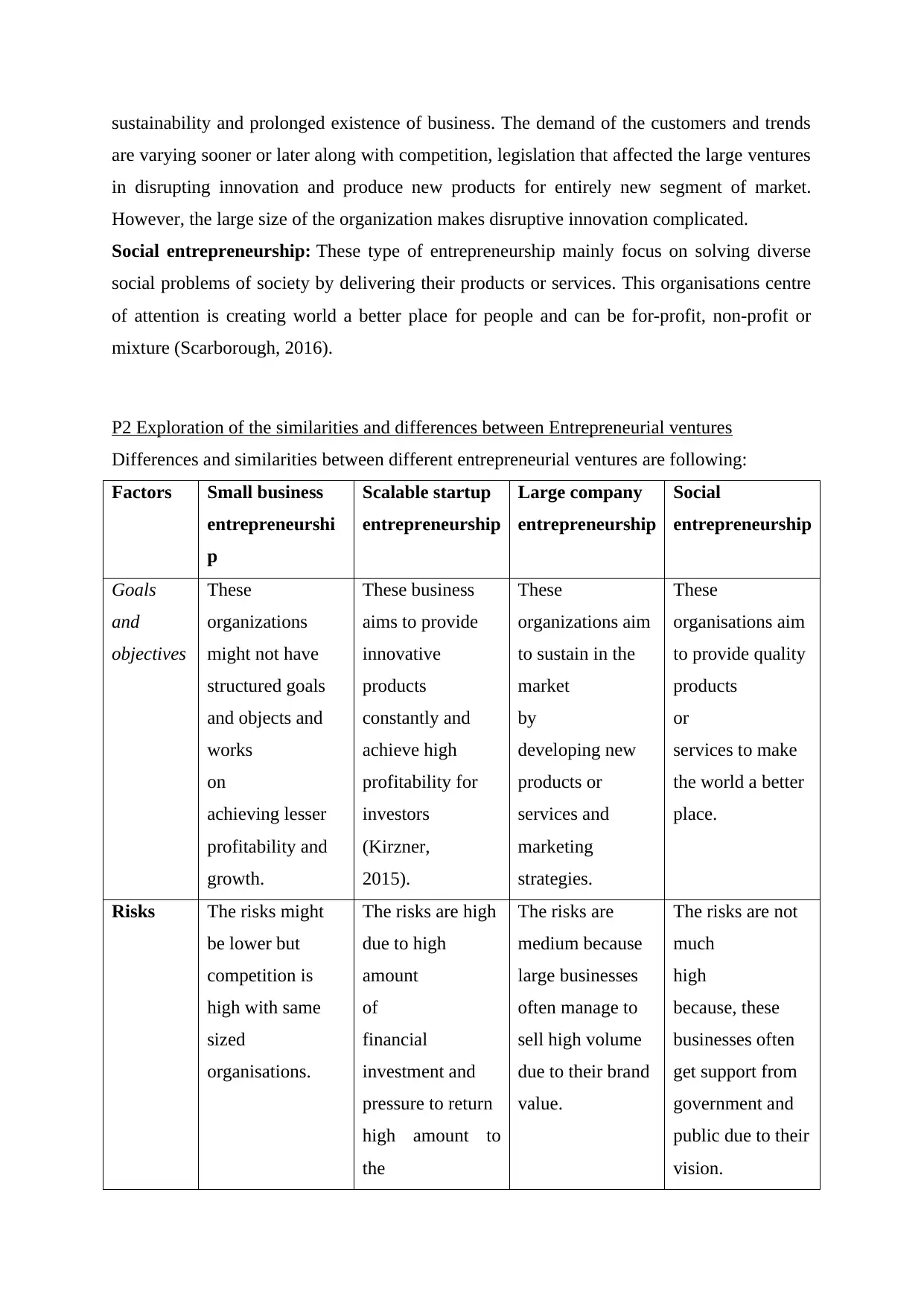
sustainability and prolonged existence of business. The demand of the customers and trends
are varying sooner or later along with competition, legislation that affected the large ventures
in disrupting innovation and produce new products for entirely new segment of market.
However, the large size of the organization makes disruptive innovation complicated.
Social entrepreneurship: These type of entrepreneurship mainly focus on solving diverse
social problems of society by delivering their products or services. This organisations centre
of attention is creating world a better place for people and can be for-profit, non-profit or
mixture (Scarborough, 2016).
P2 Exploration of the similarities and differences between Entrepreneurial ventures
Differences and similarities between different entrepreneurial ventures are following:
Factors Small business
entrepreneurshi
p
Scalable startup
entrepreneurship
Large company
entrepreneurship
Social
entrepreneurship
Goals
and
objectives
These
organizations
might not have
structured goals
and objects and
works
on
achieving lesser
profitability and
growth.
These business
aims to provide
innovative
products
constantly and
achieve high
profitability for
investors
(Kirzner,
2015).
These
organizations aim
to sustain in the
market
by
developing new
products or
services and
marketing
strategies.
These
organisations aim
to provide quality
products
or
services to make
the world a better
place.
Risks The risks might
be lower but
competition is
high with same
sized
organisations.
The risks are high
due to high
amount
of
financial
investment and
pressure to return
high amount to
the
The risks are
medium because
large businesses
often manage to
sell high volume
due to their brand
value.
The risks are not
much
high
because, these
businesses often
get support from
government and
public due to their
vision.
are varying sooner or later along with competition, legislation that affected the large ventures
in disrupting innovation and produce new products for entirely new segment of market.
However, the large size of the organization makes disruptive innovation complicated.
Social entrepreneurship: These type of entrepreneurship mainly focus on solving diverse
social problems of society by delivering their products or services. This organisations centre
of attention is creating world a better place for people and can be for-profit, non-profit or
mixture (Scarborough, 2016).
P2 Exploration of the similarities and differences between Entrepreneurial ventures
Differences and similarities between different entrepreneurial ventures are following:
Factors Small business
entrepreneurshi
p
Scalable startup
entrepreneurship
Large company
entrepreneurship
Social
entrepreneurship
Goals
and
objectives
These
organizations
might not have
structured goals
and objects and
works
on
achieving lesser
profitability and
growth.
These business
aims to provide
innovative
products
constantly and
achieve high
profitability for
investors
(Kirzner,
2015).
These
organizations aim
to sustain in the
market
by
developing new
products or
services and
marketing
strategies.
These
organisations aim
to provide quality
products
or
services to make
the world a better
place.
Risks The risks might
be lower but
competition is
high with same
sized
organisations.
The risks are high
due to high
amount
of
financial
investment and
pressure to return
high amount to
the
The risks are
medium because
large businesses
often manage to
sell high volume
due to their brand
value.
The risks are not
much
high
because, these
businesses often
get support from
government and
public due to their
vision.
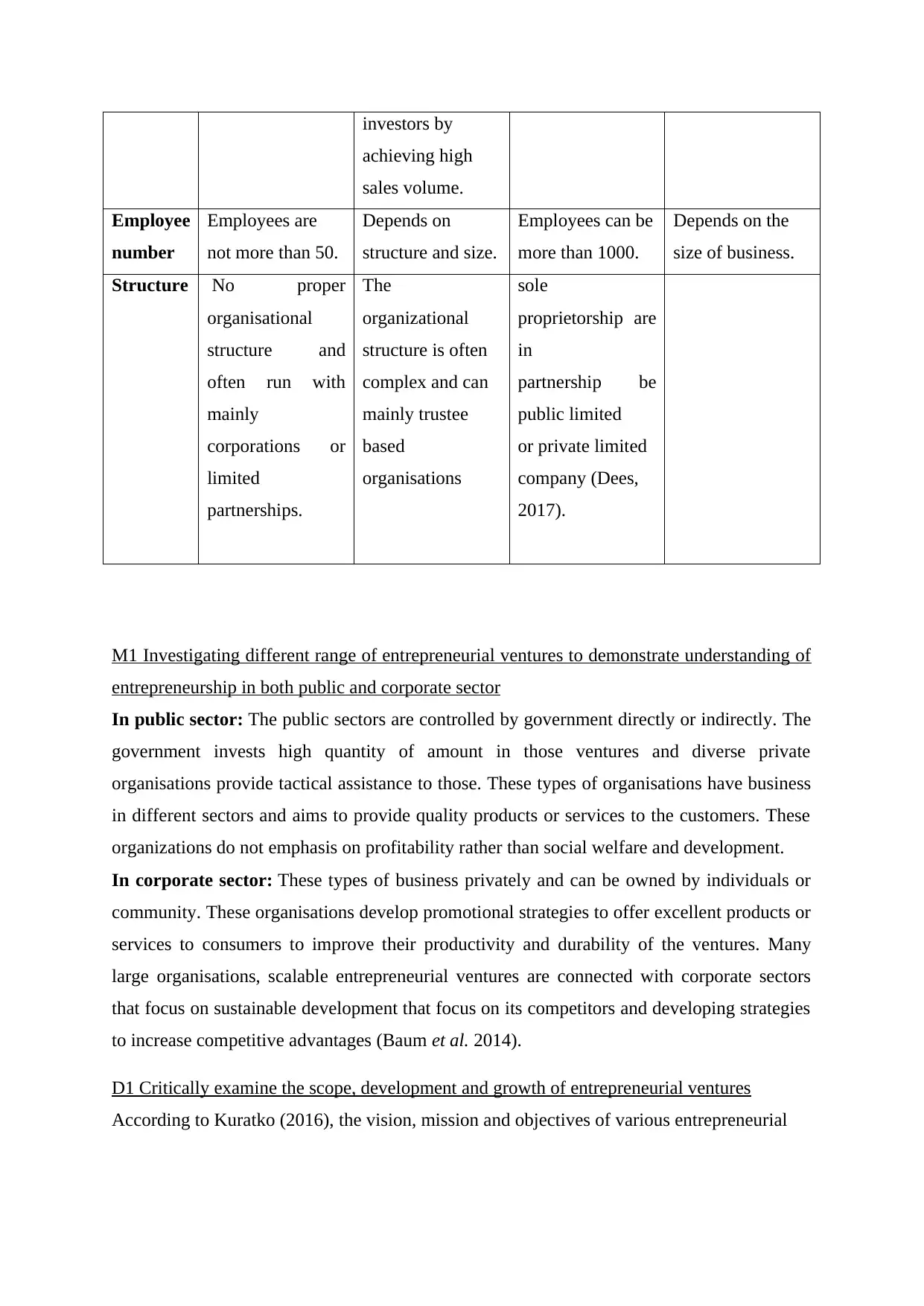
investors by
achieving high
sales volume.
Employee
number
Employees are
not more than 50.
Depends on
structure and size.
Employees can be
more than 1000.
Depends on the
size of business.
Structure No proper
organisational
structure and
often run with
mainly
corporations or
limited
partnerships.
The
organizational
structure is often
complex and can
mainly trustee
based
organisations
sole
proprietorship are
in
partnership be
public limited
or private limited
company (Dees,
2017).
M1 Investigating different range of entrepreneurial ventures to demonstrate understanding of
entrepreneurship in both public and corporate sector
In public sector: The public sectors are controlled by government directly or indirectly. The
government invests high quantity of amount in those ventures and diverse private
organisations provide tactical assistance to those. These types of organisations have business
in different sectors and aims to provide quality products or services to the customers. These
organizations do not emphasis on profitability rather than social welfare and development.
In corporate sector: These types of business privately and can be owned by individuals or
community. These organisations develop promotional strategies to offer excellent products or
services to consumers to improve their productivity and durability of the ventures. Many
large organisations, scalable entrepreneurial ventures are connected with corporate sectors
that focus on sustainable development that focus on its competitors and developing strategies
to increase competitive advantages (Baum et al. 2014).
D1 Critically examine the scope, development and growth of entrepreneurial ventures
According to Kuratko (2016), the vision, mission and objectives of various entrepreneurial
achieving high
sales volume.
Employee
number
Employees are
not more than 50.
Depends on
structure and size.
Employees can be
more than 1000.
Depends on the
size of business.
Structure No proper
organisational
structure and
often run with
mainly
corporations or
limited
partnerships.
The
organizational
structure is often
complex and can
mainly trustee
based
organisations
sole
proprietorship are
in
partnership be
public limited
or private limited
company (Dees,
2017).
M1 Investigating different range of entrepreneurial ventures to demonstrate understanding of
entrepreneurship in both public and corporate sector
In public sector: The public sectors are controlled by government directly or indirectly. The
government invests high quantity of amount in those ventures and diverse private
organisations provide tactical assistance to those. These types of organisations have business
in different sectors and aims to provide quality products or services to the customers. These
organizations do not emphasis on profitability rather than social welfare and development.
In corporate sector: These types of business privately and can be owned by individuals or
community. These organisations develop promotional strategies to offer excellent products or
services to consumers to improve their productivity and durability of the ventures. Many
large organisations, scalable entrepreneurial ventures are connected with corporate sectors
that focus on sustainable development that focus on its competitors and developing strategies
to increase competitive advantages (Baum et al. 2014).
D1 Critically examine the scope, development and growth of entrepreneurial ventures
According to Kuratko (2016), the vision, mission and objectives of various entrepreneurial
⊘ This is a preview!⊘
Do you want full access?
Subscribe today to unlock all pages.

Trusted by 1+ million students worldwide
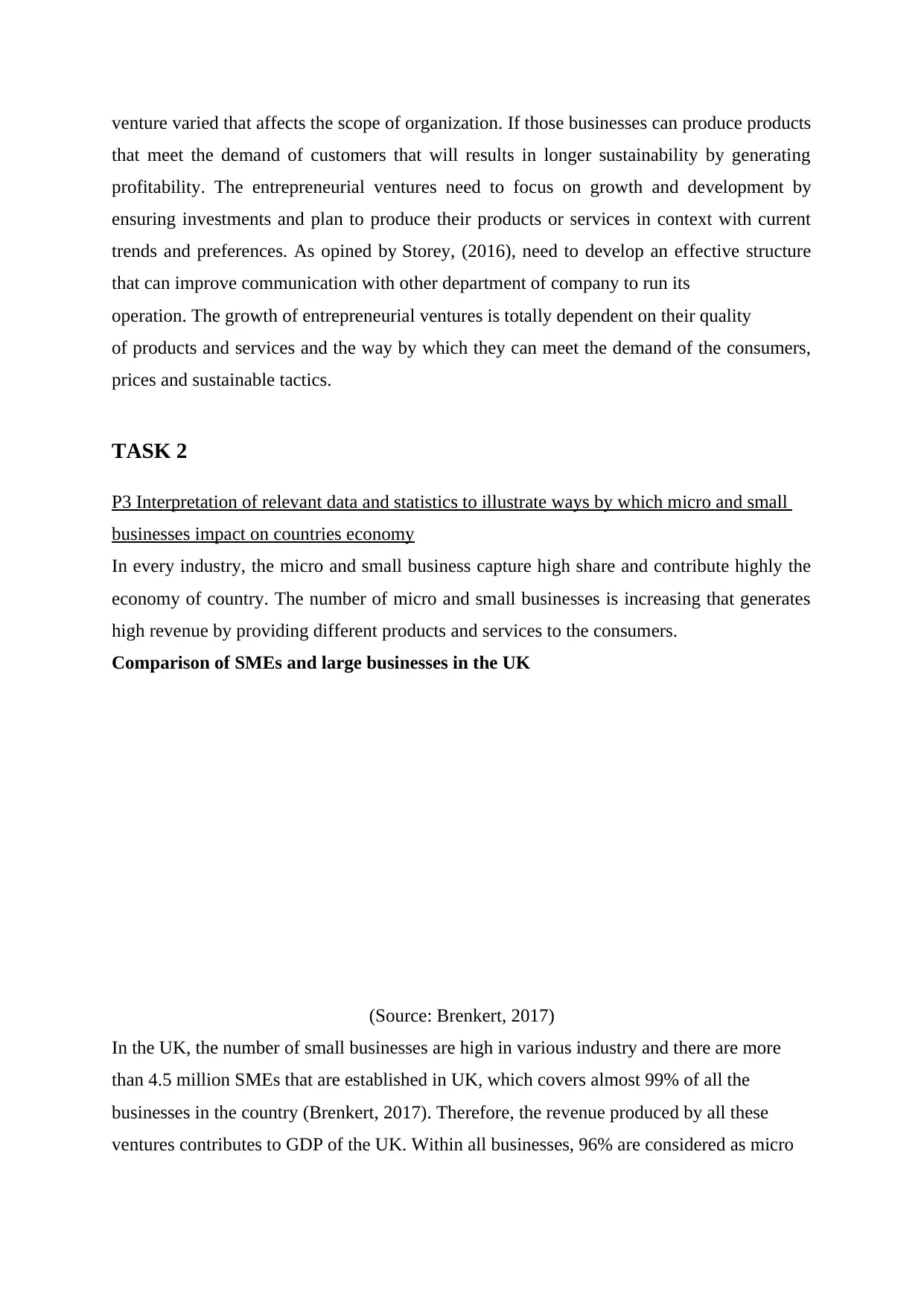
venture varied that affects the scope of organization. If those businesses can produce products
that meet the demand of customers that will results in longer sustainability by generating
profitability. The entrepreneurial ventures need to focus on growth and development by
ensuring investments and plan to produce their products or services in context with current
trends and preferences. As opined by Storey, (2016), need to develop an effective structure
that can improve communication with other department of company to run its
operation. The growth of entrepreneurial ventures is totally dependent on their quality
of products and services and the way by which they can meet the demand of the consumers,
prices and sustainable tactics.
TASK 2
P3 Interpretation of relevant data and statistics to illustrate ways by which micro and small
businesses impact on countries economy
In every industry, the micro and small business capture high share and contribute highly the
economy of country. The number of micro and small businesses is increasing that generates
high revenue by providing different products and services to the consumers.
Comparison of SMEs and large businesses in the UK
(Source: Brenkert, 2017)
In the UK, the number of small businesses are high in various industry and there are more
than 4.5 million SMEs that are established in UK, which covers almost 99% of all the
businesses in the country (Brenkert, 2017). Therefore, the revenue produced by all these
ventures contributes to GDP of the UK. Within all businesses, 96% are considered as micro
that meet the demand of customers that will results in longer sustainability by generating
profitability. The entrepreneurial ventures need to focus on growth and development by
ensuring investments and plan to produce their products or services in context with current
trends and preferences. As opined by Storey, (2016), need to develop an effective structure
that can improve communication with other department of company to run its
operation. The growth of entrepreneurial ventures is totally dependent on their quality
of products and services and the way by which they can meet the demand of the consumers,
prices and sustainable tactics.
TASK 2
P3 Interpretation of relevant data and statistics to illustrate ways by which micro and small
businesses impact on countries economy
In every industry, the micro and small business capture high share and contribute highly the
economy of country. The number of micro and small businesses is increasing that generates
high revenue by providing different products and services to the consumers.
Comparison of SMEs and large businesses in the UK
(Source: Brenkert, 2017)
In the UK, the number of small businesses are high in various industry and there are more
than 4.5 million SMEs that are established in UK, which covers almost 99% of all the
businesses in the country (Brenkert, 2017). Therefore, the revenue produced by all these
ventures contributes to GDP of the UK. Within all businesses, 96% are considered as micro
Paraphrase This Document
Need a fresh take? Get an instant paraphrase of this document with our AI Paraphraser
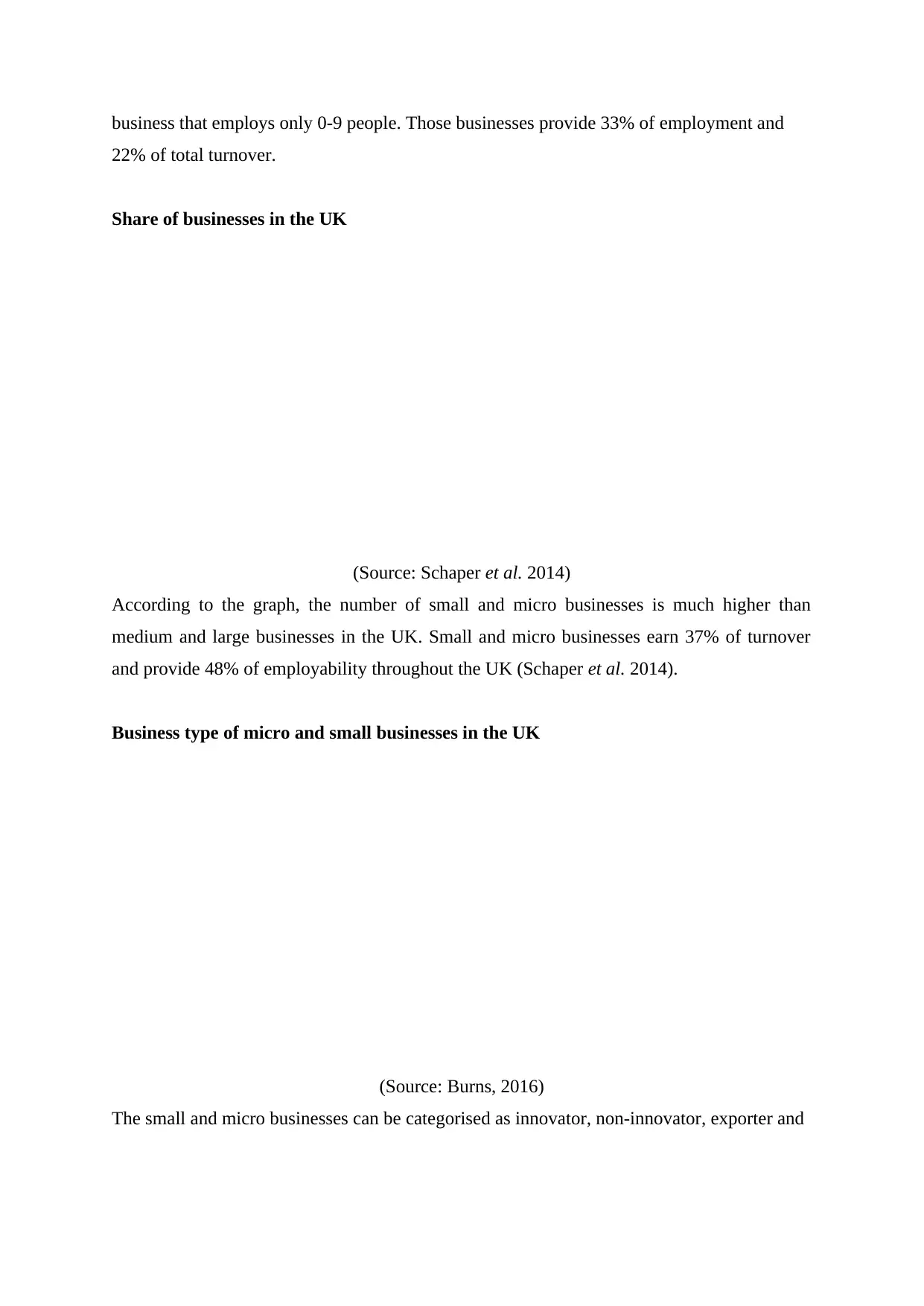
business that employs only 0-9 people. Those businesses provide 33% of employment and
22% of total turnover.
Share of businesses in the UK
(Source: Schaper et al. 2014)
According to the graph, the number of small and micro businesses is much higher than
medium and large businesses in the UK. Small and micro businesses earn 37% of turnover
and provide 48% of employability throughout the UK (Schaper et al. 2014).
Business type of micro and small businesses in the UK
(Source: Burns, 2016)
The small and micro businesses can be categorised as innovator, non-innovator, exporter and
22% of total turnover.
Share of businesses in the UK
(Source: Schaper et al. 2014)
According to the graph, the number of small and micro businesses is much higher than
medium and large businesses in the UK. Small and micro businesses earn 37% of turnover
and provide 48% of employability throughout the UK (Schaper et al. 2014).
Business type of micro and small businesses in the UK
(Source: Burns, 2016)
The small and micro businesses can be categorised as innovator, non-innovator, exporter and
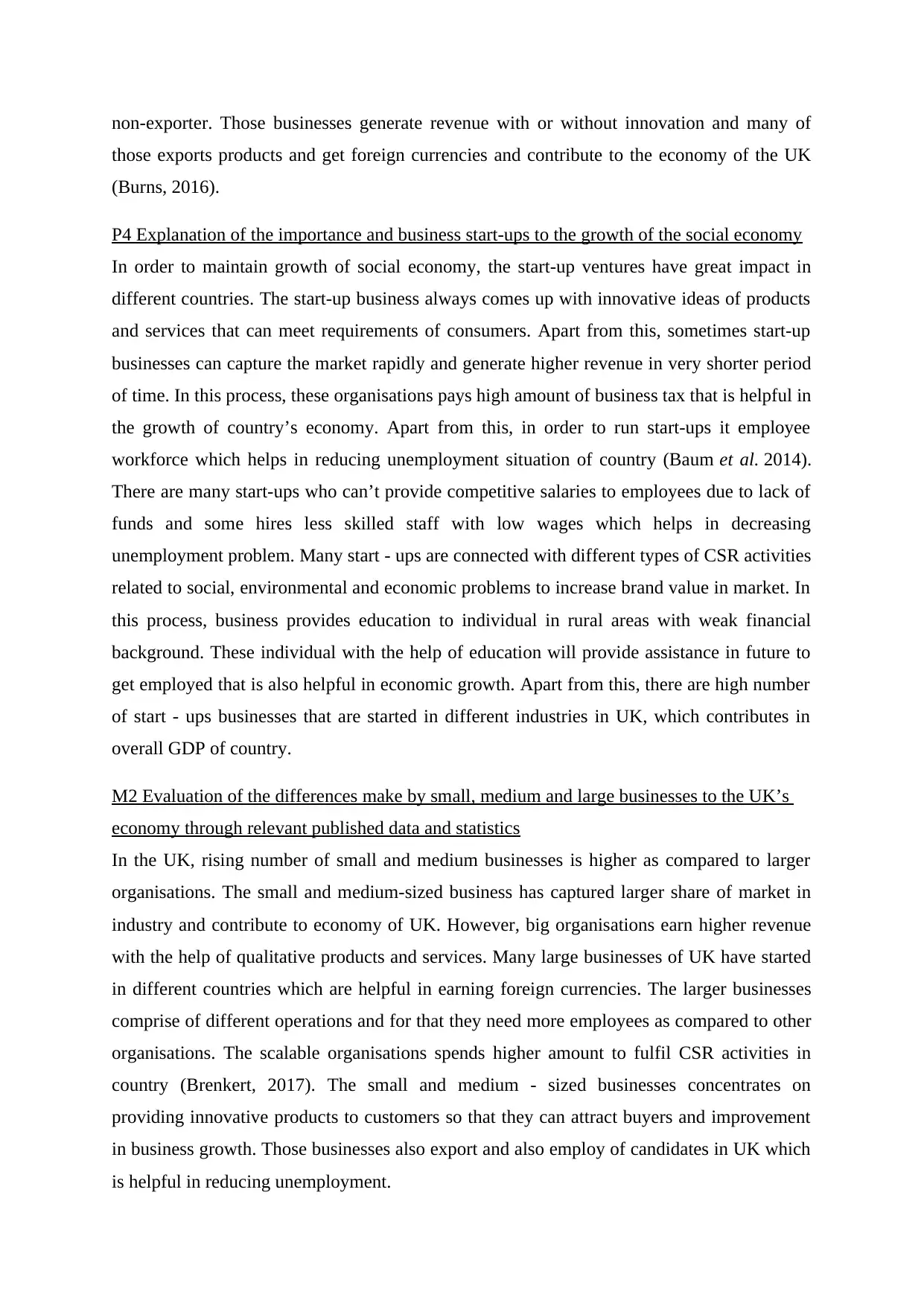
non-exporter. Those businesses generate revenue with or without innovation and many of
those exports products and get foreign currencies and contribute to the economy of the UK
(Burns, 2016).
P4 Explanation of the importance and business start-ups to the growth of the social economy
In order to maintain growth of social economy, the start-up ventures have great impact in
different countries. The start-up business always comes up with innovative ideas of products
and services that can meet requirements of consumers. Apart from this, sometimes start-up
businesses can capture the market rapidly and generate higher revenue in very shorter period
of time. In this process, these organisations pays high amount of business tax that is helpful in
the growth of country’s economy. Apart from this, in order to run start-ups it employee
workforce which helps in reducing unemployment situation of country (Baum et al. 2014).
There are many start-ups who can’t provide competitive salaries to employees due to lack of
funds and some hires less skilled staff with low wages which helps in decreasing
unemployment problem. Many start - ups are connected with different types of CSR activities
related to social, environmental and economic problems to increase brand value in market. In
this process, business provides education to individual in rural areas with weak financial
background. These individual with the help of education will provide assistance in future to
get employed that is also helpful in economic growth. Apart from this, there are high number
of start - ups businesses that are started in different industries in UK, which contributes in
overall GDP of country.
M2 Evaluation of the differences make by small, medium and large businesses to the UK’s
economy through relevant published data and statistics
In the UK, rising number of small and medium businesses is higher as compared to larger
organisations. The small and medium-sized business has captured larger share of market in
industry and contribute to economy of UK. However, big organisations earn higher revenue
with the help of qualitative products and services. Many large businesses of UK have started
in different countries which are helpful in earning foreign currencies. The larger businesses
comprise of different operations and for that they need more employees as compared to other
organisations. The scalable organisations spends higher amount to fulfil CSR activities in
country (Brenkert, 2017). The small and medium - sized businesses concentrates on
providing innovative products to customers so that they can attract buyers and improvement
in business growth. Those businesses also export and also employ of candidates in UK which
is helpful in reducing unemployment.
those exports products and get foreign currencies and contribute to the economy of the UK
(Burns, 2016).
P4 Explanation of the importance and business start-ups to the growth of the social economy
In order to maintain growth of social economy, the start-up ventures have great impact in
different countries. The start-up business always comes up with innovative ideas of products
and services that can meet requirements of consumers. Apart from this, sometimes start-up
businesses can capture the market rapidly and generate higher revenue in very shorter period
of time. In this process, these organisations pays high amount of business tax that is helpful in
the growth of country’s economy. Apart from this, in order to run start-ups it employee
workforce which helps in reducing unemployment situation of country (Baum et al. 2014).
There are many start-ups who can’t provide competitive salaries to employees due to lack of
funds and some hires less skilled staff with low wages which helps in decreasing
unemployment problem. Many start - ups are connected with different types of CSR activities
related to social, environmental and economic problems to increase brand value in market. In
this process, business provides education to individual in rural areas with weak financial
background. These individual with the help of education will provide assistance in future to
get employed that is also helpful in economic growth. Apart from this, there are high number
of start - ups businesses that are started in different industries in UK, which contributes in
overall GDP of country.
M2 Evaluation of the differences make by small, medium and large businesses to the UK’s
economy through relevant published data and statistics
In the UK, rising number of small and medium businesses is higher as compared to larger
organisations. The small and medium-sized business has captured larger share of market in
industry and contribute to economy of UK. However, big organisations earn higher revenue
with the help of qualitative products and services. Many large businesses of UK have started
in different countries which are helpful in earning foreign currencies. The larger businesses
comprise of different operations and for that they need more employees as compared to other
organisations. The scalable organisations spends higher amount to fulfil CSR activities in
country (Brenkert, 2017). The small and medium - sized businesses concentrates on
providing innovative products to customers so that they can attract buyers and improvement
in business growth. Those businesses also export and also employ of candidates in UK which
is helpful in reducing unemployment.
⊘ This is a preview!⊘
Do you want full access?
Subscribe today to unlock all pages.

Trusted by 1+ million students worldwide
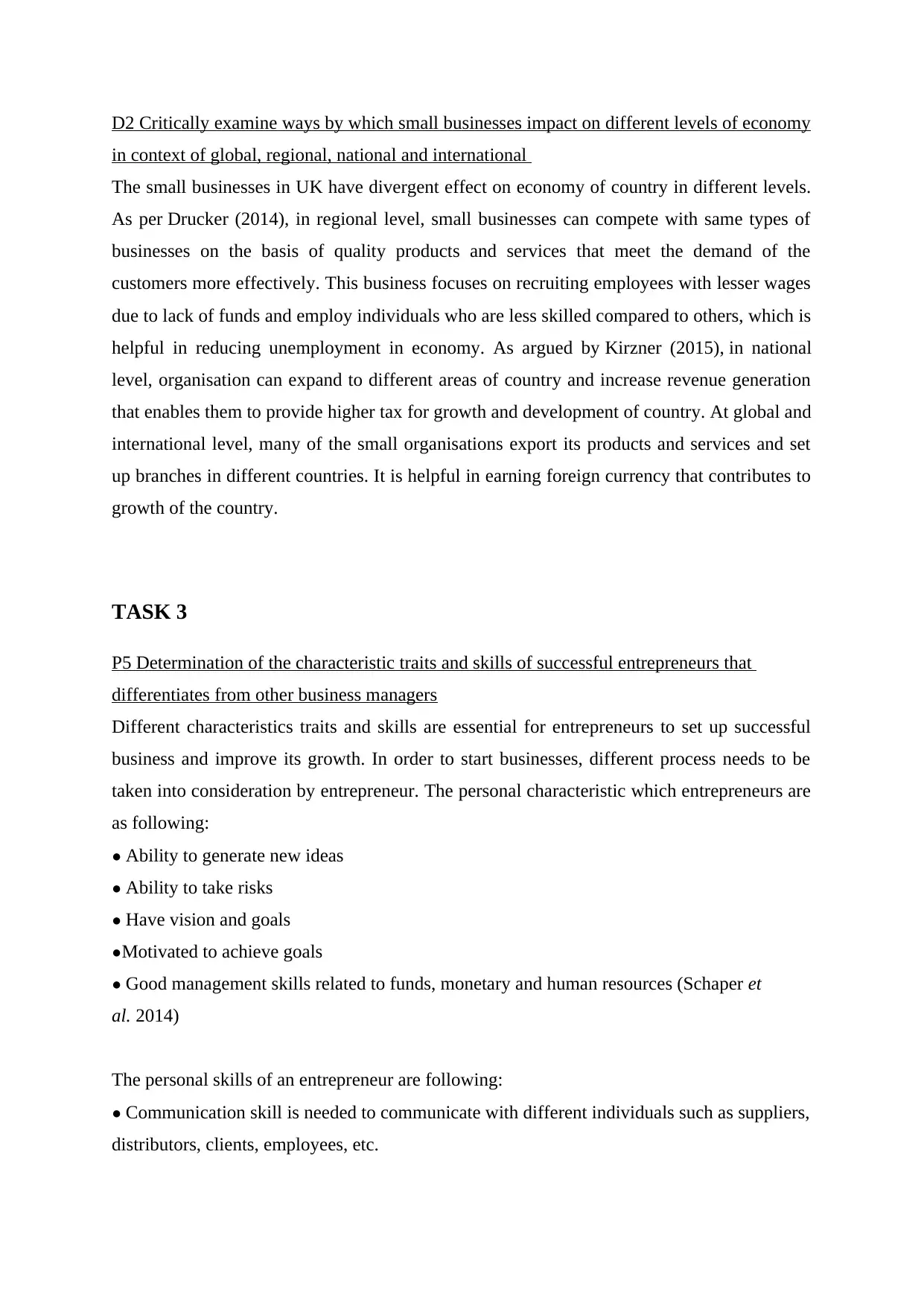
D2 Critically examine ways by which small businesses impact on different levels of economy
in context of global, regional, national and international
The small businesses in UK have divergent effect on economy of country in different levels.
As per Drucker (2014), in regional level, small businesses can compete with same types of
businesses on the basis of quality products and services that meet the demand of the
customers more effectively. This business focuses on recruiting employees with lesser wages
due to lack of funds and employ individuals who are less skilled compared to others, which is
helpful in reducing unemployment in economy. As argued by Kirzner (2015), in national
level, organisation can expand to different areas of country and increase revenue generation
that enables them to provide higher tax for growth and development of country. At global and
international level, many of the small organisations export its products and services and set
up branches in different countries. It is helpful in earning foreign currency that contributes to
growth of the country.
TASK 3
P5 Determination of the characteristic traits and skills of successful entrepreneurs that
differentiates from other business managers
Different characteristics traits and skills are essential for entrepreneurs to set up successful
business and improve its growth. In order to start businesses, different process needs to be
taken into consideration by entrepreneur. The personal characteristic which entrepreneurs are
as following:
● Ability to generate new ideas
● Ability to take risks
● Have vision and goals
●Motivated to achieve goals
● Good management skills related to funds, monetary and human resources (Schaper et
al. 2014)
The personal skills of an entrepreneur are following:
● Communication skill is needed to communicate with different individuals such as suppliers,
distributors, clients, employees, etc.
in context of global, regional, national and international
The small businesses in UK have divergent effect on economy of country in different levels.
As per Drucker (2014), in regional level, small businesses can compete with same types of
businesses on the basis of quality products and services that meet the demand of the
customers more effectively. This business focuses on recruiting employees with lesser wages
due to lack of funds and employ individuals who are less skilled compared to others, which is
helpful in reducing unemployment in economy. As argued by Kirzner (2015), in national
level, organisation can expand to different areas of country and increase revenue generation
that enables them to provide higher tax for growth and development of country. At global and
international level, many of the small organisations export its products and services and set
up branches in different countries. It is helpful in earning foreign currency that contributes to
growth of the country.
TASK 3
P5 Determination of the characteristic traits and skills of successful entrepreneurs that
differentiates from other business managers
Different characteristics traits and skills are essential for entrepreneurs to set up successful
business and improve its growth. In order to start businesses, different process needs to be
taken into consideration by entrepreneur. The personal characteristic which entrepreneurs are
as following:
● Ability to generate new ideas
● Ability to take risks
● Have vision and goals
●Motivated to achieve goals
● Good management skills related to funds, monetary and human resources (Schaper et
al. 2014)
The personal skills of an entrepreneur are following:
● Communication skill is needed to communicate with different individuals such as suppliers,
distributors, clients, employees, etc.
Paraphrase This Document
Need a fresh take? Get an instant paraphrase of this document with our AI Paraphraser
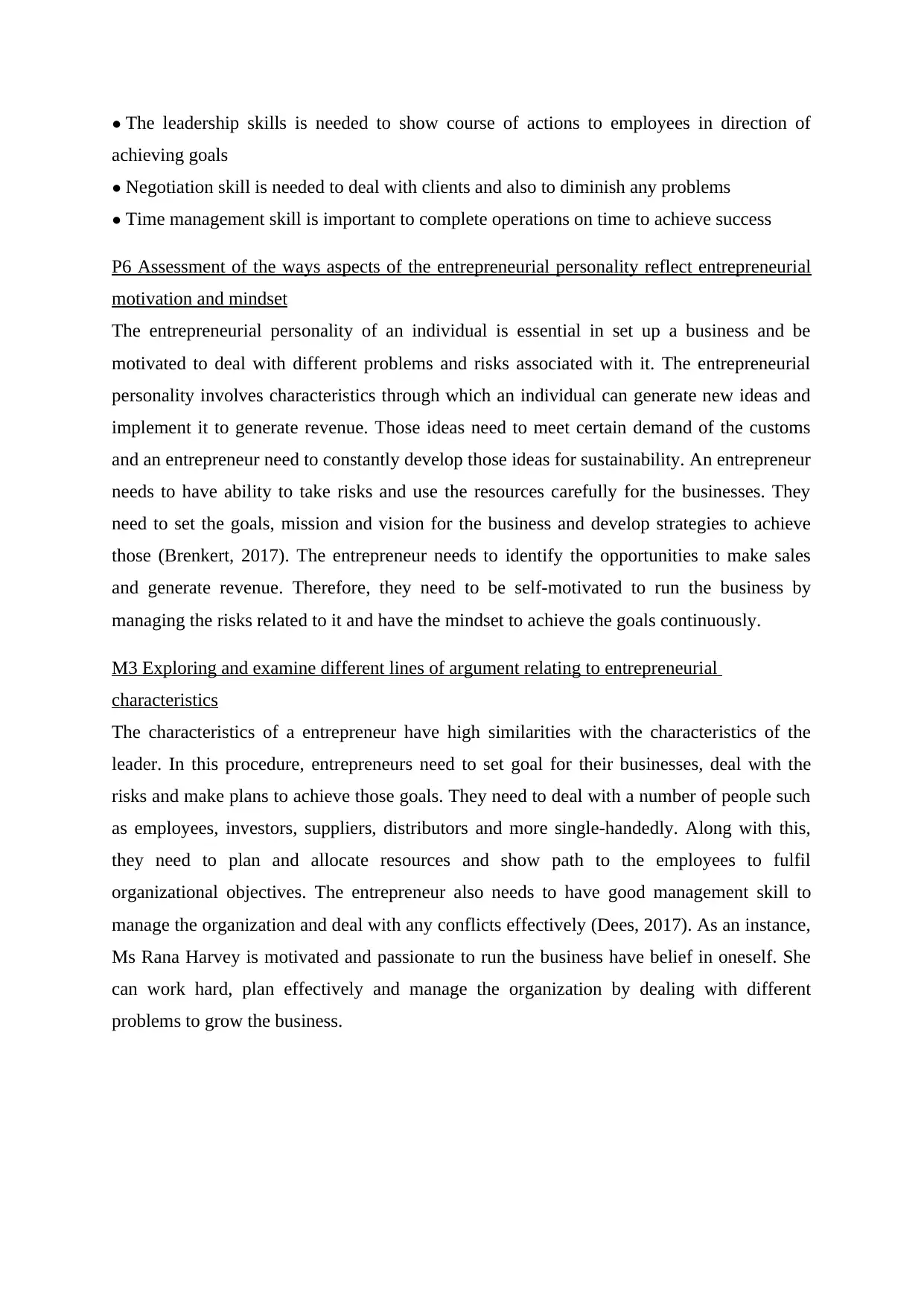
● The leadership skills is needed to show course of actions to employees in direction of
achieving goals
● Negotiation skill is needed to deal with clients and also to diminish any problems
● Time management skill is important to complete operations on time to achieve success
P6 Assessment of the ways aspects of the entrepreneurial personality reflect entrepreneurial
motivation and mindset
The entrepreneurial personality of an individual is essential in set up a business and be
motivated to deal with different problems and risks associated with it. The entrepreneurial
personality involves characteristics through which an individual can generate new ideas and
implement it to generate revenue. Those ideas need to meet certain demand of the customs
and an entrepreneur need to constantly develop those ideas for sustainability. An entrepreneur
needs to have ability to take risks and use the resources carefully for the businesses. They
need to set the goals, mission and vision for the business and develop strategies to achieve
those (Brenkert, 2017). The entrepreneur needs to identify the opportunities to make sales
and generate revenue. Therefore, they need to be self-motivated to run the business by
managing the risks related to it and have the mindset to achieve the goals continuously.
M3 Exploring and examine different lines of argument relating to entrepreneurial
characteristics
The characteristics of a entrepreneur have high similarities with the characteristics of the
leader. In this procedure, entrepreneurs need to set goal for their businesses, deal with the
risks and make plans to achieve those goals. They need to deal with a number of people such
as employees, investors, suppliers, distributors and more single-handedly. Along with this,
they need to plan and allocate resources and show path to the employees to fulfil
organizational objectives. The entrepreneur also needs to have good management skill to
manage the organization and deal with any conflicts effectively (Dees, 2017). As an instance,
Ms Rana Harvey is motivated and passionate to run the business have belief in oneself. She
can work hard, plan effectively and manage the organization by dealing with different
problems to grow the business.
achieving goals
● Negotiation skill is needed to deal with clients and also to diminish any problems
● Time management skill is important to complete operations on time to achieve success
P6 Assessment of the ways aspects of the entrepreneurial personality reflect entrepreneurial
motivation and mindset
The entrepreneurial personality of an individual is essential in set up a business and be
motivated to deal with different problems and risks associated with it. The entrepreneurial
personality involves characteristics through which an individual can generate new ideas and
implement it to generate revenue. Those ideas need to meet certain demand of the customs
and an entrepreneur need to constantly develop those ideas for sustainability. An entrepreneur
needs to have ability to take risks and use the resources carefully for the businesses. They
need to set the goals, mission and vision for the business and develop strategies to achieve
those (Brenkert, 2017). The entrepreneur needs to identify the opportunities to make sales
and generate revenue. Therefore, they need to be self-motivated to run the business by
managing the risks related to it and have the mindset to achieve the goals continuously.
M3 Exploring and examine different lines of argument relating to entrepreneurial
characteristics
The characteristics of a entrepreneur have high similarities with the characteristics of the
leader. In this procedure, entrepreneurs need to set goal for their businesses, deal with the
risks and make plans to achieve those goals. They need to deal with a number of people such
as employees, investors, suppliers, distributors and more single-handedly. Along with this,
they need to plan and allocate resources and show path to the employees to fulfil
organizational objectives. The entrepreneur also needs to have good management skill to
manage the organization and deal with any conflicts effectively (Dees, 2017). As an instance,
Ms Rana Harvey is motivated and passionate to run the business have belief in oneself. She
can work hard, plan effectively and manage the organization by dealing with different
problems to grow the business.
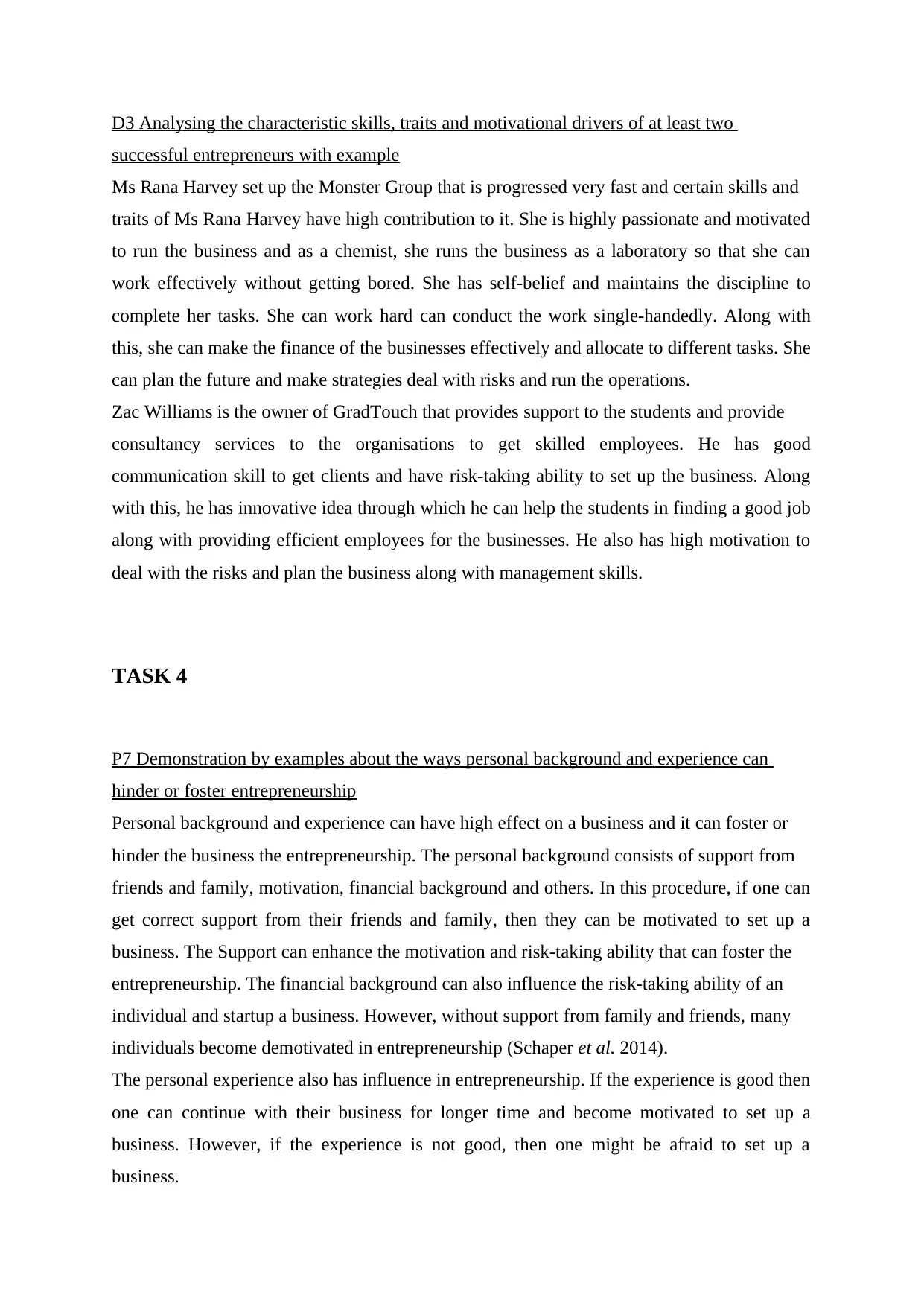
D3 Analysing the characteristic skills, traits and motivational drivers of at least two
successful entrepreneurs with example
Ms Rana Harvey set up the Monster Group that is progressed very fast and certain skills and
traits of Ms Rana Harvey have high contribution to it. She is highly passionate and motivated
to run the business and as a chemist, she runs the business as a laboratory so that she can
work effectively without getting bored. She has self-belief and maintains the discipline to
complete her tasks. She can work hard can conduct the work single-handedly. Along with
this, she can make the finance of the businesses effectively and allocate to different tasks. She
can plan the future and make strategies deal with risks and run the operations.
Zac Williams is the owner of GradTouch that provides support to the students and provide
consultancy services to the organisations to get skilled employees. He has good
communication skill to get clients and have risk-taking ability to set up the business. Along
with this, he has innovative idea through which he can help the students in finding a good job
along with providing efficient employees for the businesses. He also has high motivation to
deal with the risks and plan the business along with management skills.
TASK 4
P7 Demonstration by examples about the ways personal background and experience can
hinder or foster entrepreneurship
Personal background and experience can have high effect on a business and it can foster or
hinder the business the entrepreneurship. The personal background consists of support from
friends and family, motivation, financial background and others. In this procedure, if one can
get correct support from their friends and family, then they can be motivated to set up a
business. The Support can enhance the motivation and risk-taking ability that can foster the
entrepreneurship. The financial background can also influence the risk-taking ability of an
individual and startup a business. However, without support from family and friends, many
individuals become demotivated in entrepreneurship (Schaper et al. 2014).
The personal experience also has influence in entrepreneurship. If the experience is good then
one can continue with their business for longer time and become motivated to set up a
business. However, if the experience is not good, then one might be afraid to set up a
business.
successful entrepreneurs with example
Ms Rana Harvey set up the Monster Group that is progressed very fast and certain skills and
traits of Ms Rana Harvey have high contribution to it. She is highly passionate and motivated
to run the business and as a chemist, she runs the business as a laboratory so that she can
work effectively without getting bored. She has self-belief and maintains the discipline to
complete her tasks. She can work hard can conduct the work single-handedly. Along with
this, she can make the finance of the businesses effectively and allocate to different tasks. She
can plan the future and make strategies deal with risks and run the operations.
Zac Williams is the owner of GradTouch that provides support to the students and provide
consultancy services to the organisations to get skilled employees. He has good
communication skill to get clients and have risk-taking ability to set up the business. Along
with this, he has innovative idea through which he can help the students in finding a good job
along with providing efficient employees for the businesses. He also has high motivation to
deal with the risks and plan the business along with management skills.
TASK 4
P7 Demonstration by examples about the ways personal background and experience can
hinder or foster entrepreneurship
Personal background and experience can have high effect on a business and it can foster or
hinder the business the entrepreneurship. The personal background consists of support from
friends and family, motivation, financial background and others. In this procedure, if one can
get correct support from their friends and family, then they can be motivated to set up a
business. The Support can enhance the motivation and risk-taking ability that can foster the
entrepreneurship. The financial background can also influence the risk-taking ability of an
individual and startup a business. However, without support from family and friends, many
individuals become demotivated in entrepreneurship (Schaper et al. 2014).
The personal experience also has influence in entrepreneurship. If the experience is good then
one can continue with their business for longer time and become motivated to set up a
business. However, if the experience is not good, then one might be afraid to set up a
business.
⊘ This is a preview!⊘
Do you want full access?
Subscribe today to unlock all pages.

Trusted by 1+ million students worldwide
1 out of 15
Related Documents
Your All-in-One AI-Powered Toolkit for Academic Success.
+13062052269
info@desklib.com
Available 24*7 on WhatsApp / Email
![[object Object]](/_next/static/media/star-bottom.7253800d.svg)
Unlock your academic potential
Copyright © 2020–2026 A2Z Services. All Rights Reserved. Developed and managed by ZUCOL.

